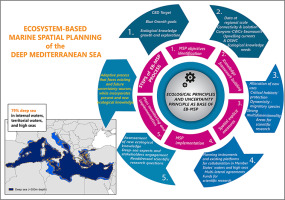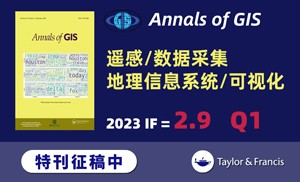当前位置:
X-MOL 学术
›
Sci. Total Environ.
›
论文详情
Our official English website, www.x-mol.net, welcomes your
feedback! (Note: you will need to create a separate account there.)
Towards an Ecosystem-Based Marine Spatial Planning in the deep Mediterranean Sea.
Science of the Total Environment ( IF 8.2 ) Pub Date : 2020-01-23 , DOI: 10.1016/j.scitotenv.2020.136884 E Manea 1 , S Bianchelli 2 , E Fanelli 2 , R Danovaro 3 , E Gissi 1
Science of the Total Environment ( IF 8.2 ) Pub Date : 2020-01-23 , DOI: 10.1016/j.scitotenv.2020.136884 E Manea 1 , S Bianchelli 2 , E Fanelli 2 , R Danovaro 3 , E Gissi 1
Affiliation

|
The deep sea covers about 79% of the Mediterranean basin, including habitats potentially able to deliver multiple ecosystem services and numerous resources of high economic value. Thus, the deep Mediterranean Sea represents an important frontier for marine resources exploitation, which is embedded within the European Blue Growth Strategy goals and agendas. The deep sea is crucial for the ecological functioning of the entire basin. For this reason, the deep Mediterranean deserves protection from the potential cumulative impacts derived from existent and developing human activities. Marine Spatial Planning (MSP) has been identified as key instrument for spatially allocating maritime uses in the sea space avoiding spatial conflicts between activities, and between activities and the environment. Indeed, MSP incorporates the ecosystem-based approach (EB-MSP) to balance both socio-economic and environmental objectives, in line with the Maritime Spatial Planning Directive and the Marine Strategy Framework Directive. Despite MSP is under implementation in Europe, the Directive is not applied yet for the managing and monitoring of the environmental status of the deep sea. In the Mediterranean, deep areas fall both in internal and territorial waters, and in High Seas, and its management framework turns out to be complicated. Moreover, a certain level of cumulative impacts in the deep Mediterranean has been already identified and likely underestimated because of paucity of knowledge related with deep-sea ecosystems. Thus, the implementation of scientific knowledge and the establishment of a sustainable management regime of deep-sea resources and space are urgent. This study aims at reflecting on the best available ecological knowledge on the deep Mediterranean to incorporate conservation objectives in EB-MSP. We propose a framework to include key ecological principles in the relevant phases of any EB-MSP processes taking in consideration existing socio-economic and conservation scenarios in the region. We add the uncertainty principle to reflect on the still unexplored and missing knowledge related to the deep Mediterranean. Here, we resume some guidelines to overcome limits and bottlenecks while ensuring protection of deep-sea ecosystems and resources in the Mediterranean Sea.
中文翻译:

迈向地中海深处基于生态系统的海洋空间规划。
深海覆盖了地中海盆地的约79%,其中包括能够提供多种生态系统服务和众多具有高经济价值的资源的栖息地。因此,地中海深处是海洋资源开发的重要前沿领域,它已嵌入《欧洲蓝色增长战略》的目标和议程之内。深海对于整个盆地的生态功能至关重要。因此,深海的地中海值得保护,以免因人类活动的发展而产生的潜在累积影响。海洋空间规划(MSP)已被确定为在海洋空间中空间分配海洋用途,避免活动之间以及活动与环境之间发生空间冲突的关键工具。确实,MSP结合了《海洋空间规划指令》和《海洋战略框架指令》,结合了基于生态系统的方法(EB-MSP)以平衡社会经济和环境目标。尽管欧洲正在实施MSP,但该指令尚未用于管理和监视深海的环境状况。在地中海,深水区既落在内陆水域,也落在公海,其管理框架却变得复杂。此外,由于与深海生态系统有关的知识匮乏,已经确定了在地中海深处一定程度的累积影响,并可能低估了这种影响。从而,迫切需要执行科学知识并建立可持续的深海资源和空间管理制度。这项研究旨在反思地中海深处可获得的最佳生态知识,以将保护目标纳入EB-MSP中。我们建议一个框架,在考虑到该地区现有的社会经济和保护情景的情况下,将任何主要生态原则纳入任何EB-MSP流程的相关阶段。我们添加了不确定性原理,以反思与深海地中海地区有关的尚未探索和缺失的知识。在这里,我们恢复了一些指导方针,以克服限制和瓶颈,同时确保保护地中海的深海生态系统和资源。这项研究旨在反思地中海深处可获得的最佳生态知识,以将保护目标纳入EB-MSP中。我们建议一个框架,在考虑到该地区现有的社会经济和保护情景的情况下,将任何主要生态原则纳入任何EB-MSP流程的相关阶段。我们添加了不确定性原理,以反思与深海地中海有关的仍未探索和缺失的知识。在这里,我们恢复了一些指导方针,以克服限制和瓶颈,同时确保保护地中海的深海生态系统和资源。本研究旨在反思地中海深处可获得的最佳生态知识,以将保护目标纳入EB-MSP中。我们建议一个框架,在考虑到该地区现有的社会经济和保护情景的情况下,将任何主要生态原则纳入任何EB-MSP流程的相关阶段。我们添加了不确定性原理,以反思与深海地中海有关的仍未探索和缺失的知识。在这里,我们恢复了一些指导方针,以克服限制和瓶颈,同时确保保护地中海的深海生态系统和资源。我们建议一个框架,在考虑到该地区现有的社会经济和保护情景的情况下,将任何主要生态原则纳入任何EB-MSP流程的相关阶段。我们添加了不确定性原理,以反思与深海地中海地区有关的尚未探索和缺失的知识。在这里,我们恢复了一些指导方针,以克服限制和瓶颈,同时确保保护地中海的深海生态系统和资源。我们建议一个框架,在考虑到该地区现有的社会经济和保护情景的情况下,将任何主要生态原则纳入任何EB-MSP流程的相关阶段。我们添加了不确定性原理,以反思与深海地中海有关的仍未探索和缺失的知识。在这里,我们恢复了一些指导方针,以克服限制和瓶颈,同时确保保护地中海的深海生态系统和资源。
更新日期:2020-01-23
中文翻译:

迈向地中海深处基于生态系统的海洋空间规划。
深海覆盖了地中海盆地的约79%,其中包括能够提供多种生态系统服务和众多具有高经济价值的资源的栖息地。因此,地中海深处是海洋资源开发的重要前沿领域,它已嵌入《欧洲蓝色增长战略》的目标和议程之内。深海对于整个盆地的生态功能至关重要。因此,深海的地中海值得保护,以免因人类活动的发展而产生的潜在累积影响。海洋空间规划(MSP)已被确定为在海洋空间中空间分配海洋用途,避免活动之间以及活动与环境之间发生空间冲突的关键工具。确实,MSP结合了《海洋空间规划指令》和《海洋战略框架指令》,结合了基于生态系统的方法(EB-MSP)以平衡社会经济和环境目标。尽管欧洲正在实施MSP,但该指令尚未用于管理和监视深海的环境状况。在地中海,深水区既落在内陆水域,也落在公海,其管理框架却变得复杂。此外,由于与深海生态系统有关的知识匮乏,已经确定了在地中海深处一定程度的累积影响,并可能低估了这种影响。从而,迫切需要执行科学知识并建立可持续的深海资源和空间管理制度。这项研究旨在反思地中海深处可获得的最佳生态知识,以将保护目标纳入EB-MSP中。我们建议一个框架,在考虑到该地区现有的社会经济和保护情景的情况下,将任何主要生态原则纳入任何EB-MSP流程的相关阶段。我们添加了不确定性原理,以反思与深海地中海地区有关的尚未探索和缺失的知识。在这里,我们恢复了一些指导方针,以克服限制和瓶颈,同时确保保护地中海的深海生态系统和资源。这项研究旨在反思地中海深处可获得的最佳生态知识,以将保护目标纳入EB-MSP中。我们建议一个框架,在考虑到该地区现有的社会经济和保护情景的情况下,将任何主要生态原则纳入任何EB-MSP流程的相关阶段。我们添加了不确定性原理,以反思与深海地中海有关的仍未探索和缺失的知识。在这里,我们恢复了一些指导方针,以克服限制和瓶颈,同时确保保护地中海的深海生态系统和资源。本研究旨在反思地中海深处可获得的最佳生态知识,以将保护目标纳入EB-MSP中。我们建议一个框架,在考虑到该地区现有的社会经济和保护情景的情况下,将任何主要生态原则纳入任何EB-MSP流程的相关阶段。我们添加了不确定性原理,以反思与深海地中海有关的仍未探索和缺失的知识。在这里,我们恢复了一些指导方针,以克服限制和瓶颈,同时确保保护地中海的深海生态系统和资源。我们建议一个框架,在考虑到该地区现有的社会经济和保护情景的情况下,将任何主要生态原则纳入任何EB-MSP流程的相关阶段。我们添加了不确定性原理,以反思与深海地中海地区有关的尚未探索和缺失的知识。在这里,我们恢复了一些指导方针,以克服限制和瓶颈,同时确保保护地中海的深海生态系统和资源。我们建议一个框架,在考虑到该地区现有的社会经济和保护情景的情况下,将任何主要生态原则纳入任何EB-MSP流程的相关阶段。我们添加了不确定性原理,以反思与深海地中海有关的仍未探索和缺失的知识。在这里,我们恢复了一些指导方针,以克服限制和瓶颈,同时确保保护地中海的深海生态系统和资源。









































 京公网安备 11010802027423号
京公网安备 11010802027423号